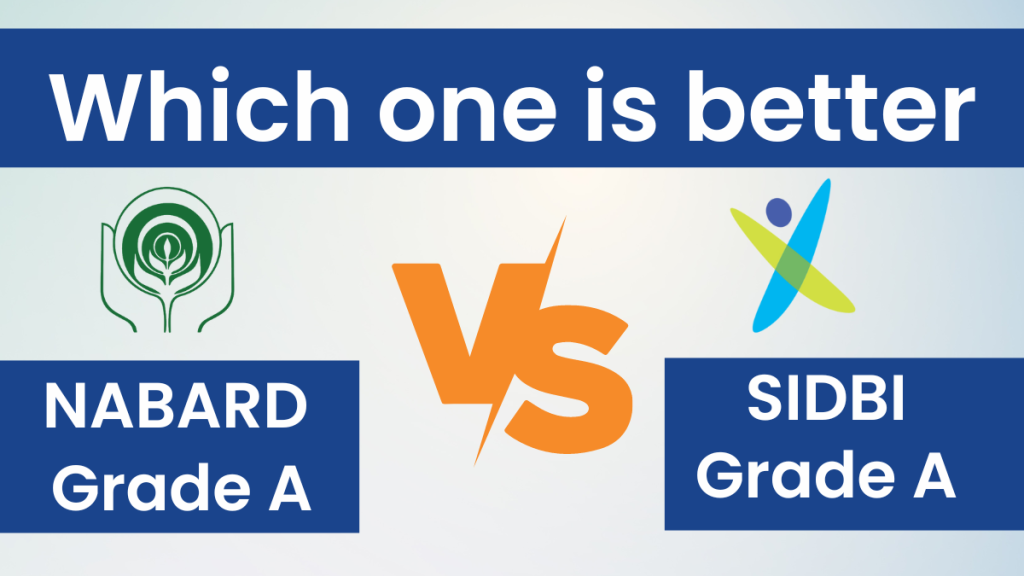The Indian financial realm is marked by a rich landscape, where entities play a pivotal part in fueling economic growth. At the forefront of this domain are the National Bank for Agriculture and Rural Development (NABARD) and the Small Industries Development Bank of India (SIDBI). These two institutions, though unique in their focus, are crucial to the nation’s development in the banking sector.

For those aiming to serve as civil servants and drive development, landing a role in either NABARD or SIDBI is highly sought after. Such positions promise the chance to work on projects that have a real impact and to play a part in the country’s advance. Alongside the opportunity to make a ground level impact in the nation’s trajectory towards growth, government jobs come with lucrative benefits and a healthy work life balance.
Several aspirants prepare and take the NABARD Grade A and SIDBI Grade A exams each year. Preparing for government exams requires extreme focus and dedication and that is why it becomes critical to choose one that aligns best with your capabilities and interests.
This blog seeks to thoroughly compare NABARD Grade A and SIDBI Grade A posts. By delving into their duties, roles, and the pathways they offer for career growth, we aim to help you make a well-informed choice on your journey in choosing which exam you should prepare for.
Career Growth and Promotion Prospects
As important as it is to choose a career that fulfils you and makes you feel like you fit right in, it is also important to think of the long-term opportunities it can provide you. In this section we will look at the career growth and promotion opportunities offered by NABARD Grade A exam and SIDBI Grade A exam qualifiers.
Both NABARD and SIDBI offer well-defined career paths with opportunities for advancement for their officers. The typical career progression for Grade A officers in both organizations is as follows:
- Assistant Manager: Entry-level position handling a wide range of responsibilities as discussed earlier.
- Manager: After gaining experience, officers are promoted to manage teams and handle more complex projects.
- Assistant General Manager (AGM): This role involves overseeing larger departments and strategic initiatives.
- Deputy General Manager (DGM): Senior management position with a focus on policy formulation and overall branch/regional office performance.
- General Manager (GM): Responsible for leading a specific function or geographical area.
- Chief General Manager (CGM): Heads a regional office or a major department within the organization.
- Executive Director (ED): Part of the top management team, responsible for strategic decision-making.
- Director: Board-level position with significant influence on the organization’s direction.
Both organizations also promote based on a combination of factors like performance in assigned roles, contribution to projects, and demonstration of leadership qualities. There are no significant limitations regarding promotions in either organization. However, competition can be high, especially for senior management positions.
We can see that the promotion and career related opportunities for both NABARD Grade A and SIDBI Grade A are almost identical. A SIDBI Grade Officer’s salary and a NABARD Grade A officer’s salary have negligible differences and are almost equal.
The salary with other benefits is also very similar for both roles. This means that to choose one out of the two, one should focus on other aspects of the posts like the job profile and required skillsets.
Roles and Responsibilities of a NABARD Grade A Officer
It is crucial to understand what you are expected to do once you qualify for any examination to determine whether it suits your long-term goals and aptitude or not. We will now take a detailed look into the job profiles of NABARD Grade A and SIDBI Grade A officers one by one.
A NABARD Grade A officer, designated as an Assistant Manager, plays a pivotal role in promoting agriculture and rural development across India. Assistant Managers report to the Chief General Manager (CGM) of the regional NABARD office. While postings can be anywhere in India, excluding the home state, they are typically in state capitals.
Their responsibilities are diverse and encompass various activities aimed at uplifting the rural economy. Following is a breakdown of a NABARD Grade A officer’s job profile:
- Policy Implementation and Collaboration: The primary duties of NABARD Grade A officers include implementing government policies and development initiatives in rural areas. This involves collaborating with other government and non-government agencies to identify and address local challenges.
- Rural Credit Management: Managing credit facilities for farmers, self-help groups, and rural enterprises are also another part of this job profile. This includes assessing loan requirements, conducting field inspections, and ensuring timely disbursal and proper utilization of funds.
- Project Monitoring and Evaluation: NABARD Grade A officers also participate in evaluating ongoing agricultural rural projects in achieving objectives, financial management, and impact on beneficiaries. Based on monitoring and data analysis, they suggest improvements to optimize schemes.
- Research and Analysis: They are expected to undertake research studies on rural financing models, agricultural trends, and developmental programs. This research aids in policy formulation and identifying gaps in existing interventions.
- Loan Monitoring and Recovery: This aspect of the officers’ work includes inspecting the end-use of loans provided to rural borrowers like farmers and other agrarian workers. Officers are also tasked with monitoring repayment of agricultural and related loans.
- Risk Management: NABARD Grade A officers lead project teams to manage financial risks associated with rural lending operations. This includes setting suitable risk mitigation strategies and ensuring the security of bank investments and assets.
- Representation and Coordination: Grade A officers also represent NABARD at state and district-level committee meetings and coordinated forums on rural economy and banking.
NABARD Grade A Assistant Managers are entrusted with a broad range of tasks related to agriculture and rural development as mandated by both central and state governments. They must be adept at multitasking and adapting to diverse responsibilities.
Roles and Responsibilities of a SIDBI Grade A Officer
Similar to NABARD Grade A officers, SIDBI Grade A officers, also known as Assistant Managers, play a crucial role in development banking, but with a specific focus on Small and Medium Enterprises (SMEs), microfinance, and startups. Their responsibilities encompass various aspects of promoting and financing these sectors. A SIDBI Grade A officer’s main roles and day to day responsibilities include:
- Credit Delivery and Monitoring: SIDBI Grade A officers augment credit penetration in the MSME, microfinance, and startup/venture capital sectors. This involves analyzing loan applications, evaluating financial viability of projects, and ensuring proper credit delivery and monitoring mechanisms are in place.
- Entrepreneurship Promotion: They are also expected to contribute to entrepreneurship promotion and skill development initiatives for the MSME sector. This might involve collaborating with various stakeholders like government agencies, training institutions, and industry associations.
- Market Research and Analysis: SIDBI Grade A officers act as key input providers in the decision-making process by gathering regular market feedback and research data on trends in specific sectors and clusters. This information helps SIDBI prioritize new initiatives and projects to support businesses effectively.
- Internal Management and Control: Participating in internal management/administration, control, and monitoring functions is another responsibility of SIDBI officers. This ensures SIDBI remains adaptable and responsive to the changing dynamics of the MSME sector and the overall economy.
- Strategic Initiatives: SIDBI Grade A officers are also expected to assist in developing and implementing strategies to enhance SIDBI’s productivity and overall financial performance.
- Additional Duties: They also fulfil any other tasks assigned by the bank, which could involve research on specific industries, developing financial products for SMEs, or liaising with government bodies on policy initiatives. Building strong relationships with various stakeholders like entrepreneurs, industry associations, and government agencies is a crucial aspect of the role.
The above job description for a SIDBI Grade A officer highlights that the MSME and startup landscapes are constantly evolving. SIDBI Grade A officers need to be adaptable, possess strong learning skills, and stay updated on industry trends.
What it Takes
NABARD Grade A and SIDBI Grade A officers require a strong foundation in core skills to excel in their respective roles. Both positions demand officers to be proficient in analyzing data, interpreting financial statements, and assessing project viability. Problem-solving skills are essential, as officers will tackle complex challenges related to rural development (NABARD) or MSME/startup financing (SIDBI).
Effective communication, written and verbal, is required to interact with stakeholders, prepare reports, and present findings. Decision-making skills are critical, as officers will have to make sound financial decisions based on analysis and risk assessment. Proficiency in using spreadsheets, financial modeling software, and other relevant programs is also necessary in this field.
Beyond these core skills, both organizations seek individuals with leadership potential to manage teams, motivate colleagues, and take initiative. The ability to work effectively in a team environment and collaborate with diverse stakeholders is essential. High ethical standards and a strong work ethic are vital for positions of financial responsibility. The development banking landscape is constantly evolving, so the ability to adapt and learn new skills is crucial for both NABARD Grade A and SIDBI Grade A officers.
While these are the general requirements based on the overlap between the sectors that both these roles oversee, the key differences in skillsets required by NABARD Grade A and SIDBI Grade A are as follows:
NABARD Grade A Officer
- Aptitude: A passion for rural development and a desire to contribute to social impact.
- Qualities: Strong understanding of rural issues, cultural sensitivity, and ability to work effectively in rural settings.
The industry specific skills required by a NABARD Grade A officer are:
- Policy Research: Ability to conduct research on rural development issues, analyze policies, and make evidence-based recommendations.
- Project Appraisal: Skills to assess the viability of rural development projects considering technical, financial, economic, and social aspects.
- Institutional Development: Expertise in strengthening rural institutions like cooperatives and self-help groups.
SIDBI Grade A Officer
- Aptitude: An interest in the MSME and startup ecosystem, and a desire to foster entrepreneurial growth.
- Qualities: Strong understanding of business fundamentals, risk appetite, and a commercial mindset.
The industry specific skills required by a SIDBI Grade A officer are:
- Market Research: Ability to conduct market research to understand trends and opportunities in specific MSME or startup sectors.
- Financial Modeling: Skills to build and analyze financial models to assess the viability of business plans from MSMEs and startups.
- Stakeholder Management: Ability to build strong relationships with entrepreneurs, industry associations, and investors.
- Industry-Specific Knowledge (Optional): Deep understanding of the financial needs, regulations, and challenges specific to a chosen MSME or startup sector (manufacturing, IT, healthcare).
In essence, NABARD seeks officers with a social development focus and expertise in rural issues. SIDBI, on the other hand, requires officers with a commercial mindset, an understanding of business financing, and the ability to navigate the dynamic MSME and startup landscape.
Preparing with ixamBee
ixamBee helps students prepare for the government banking exam of their choice. Now that you have a fair idea of the key differences and similarities between NABARD Grade A and SIDBI Grade A, based on your choice you can visit our online course for each.
The courses are based on the unique syllabus of each exam. The NABARD Grade A exam syllabus entails a detailed understanding of agricultural and rural development along with economic and social issues (ESI). It also includes questions on Quantitative Aptitude, Reasoning Ability, Computer Knowledge, Decision Making and General Awareness. These topics are covered in comprehensive detail for students within the ixamBee NABARD Grade A online course.
The SIDBI Grade A exam syllabus entails of the English Language, General Awareness and Reasoning Aptitude Questions. The exam structure and syllabus are covered in detail in our SIDBI Grade A online course. IxamBee has detailed courses covering the preparation for each stage of theSIDBI Grade A exam. Our SIDBI Grade A Interview Guidance Course helps students prepare for the interview round of the exam with one-on-one focus from industry experts. General knowledge is common in both these exams and is also critical in the prelims stages of most government exams. To stay up to date with static GK and new developments that are important from an exam point of view, you can check out ixamBee’s Beepedia, which is a daily updated repository of current affairs.
Quantitative aptitude and reasoning is also common between NABARD Grade A and SIDBI Grade A syllabi, and ixamBee offers quantitative aptitude daily quizzes so that you can practice your skills to perfection.
Conclusion
This analysis has unpacked the exciting possibilities offered by NABARD Grade A and SIDBI Grade A positions. Both roles are crucial in development banking but cater to distinct areas. While both require strong analytical, communication, and decision-making skills, the specific skillsets come into play differently.
NABARD emphasizes policy research, project appraisal in rural development, and expertise in strengthening rural institutions. SIDBI leans towards market research, financial modeling, stakeholder management, and potentially gaining in-depth knowledge of a chosen MSME or startup sector.
There’s no single “better” option. The ideal path depends on your individual aspirations. Consider your interests – are you drawn to rural development or fostering entrepreneurial growth? Analyze your existing skills and aptitude – which role aligns better with your strengths and areas for development? Think about your long-term career goals – which organization aligns better with your vision for the future?
To help you prepare 50% faster for competitive exams, ixamBee provides a free Mock Test Series and all the Current Affairs in English and Current Affairs in Hindi in the BeePedia capsules for GA Preparation. You can also get the latest updates for Bank PO, Bank Clerk, SSC, RBI Grade B, NABARD, and Other Government Jobs.
Also Read
Code Cracked: How should working aspirants prepare for the NABARD Grade A examination?
Cracking NABARD Grade A Exam: Tips and Preparation Strategies
Significant Mistakes to Avoid During SIDBI Grade A Interview














